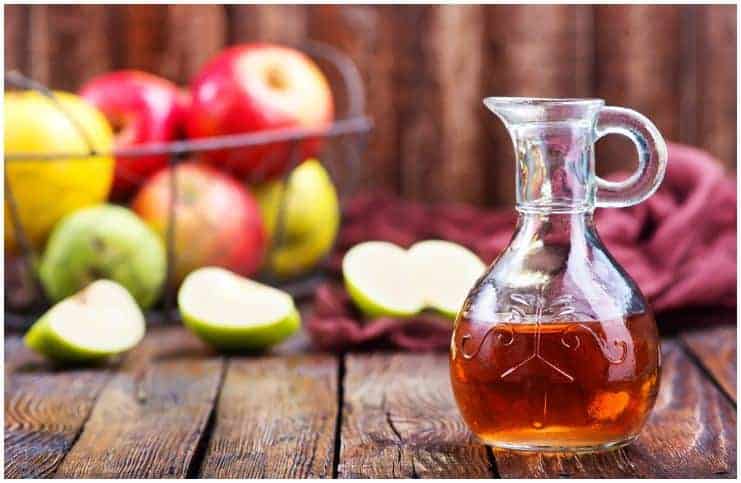Bacterial vaginosis (BV) is a frequent cause of abnormal vaginal discharge and can be quite frustrating to manage in its recurrent form.
It is estimated that up to one-third of the women in the United States have this condition right now. Moreover, it is the most common vaginal infection in women aged 15-44. In addition, it is essential to understand that it is not a sexually transmitted disease – it is simply an imbalance of “bad” and “good” bacteria in the vagina.
Symptoms of Bacterial Vaginosis:
- foul-smelling, “fishy” vaginal odor;
- itching around the outside of the vagina;
- a burning sensation during urination;
- vaginal discharge.
Causes
If there are too many harmful bacteria, they disrupt the natural equilibrium of microorganisms in your vagina and cause this problem. The precise cause of the imbalance isn’t known, but some activities, such as – douching, smoking, taking some prescription medicines, improper diet, or stress, can increase the risk.
How To Use Apple Cider Vinegar For BV
Douching – you could choose to douche with apple cider vinegar since ACV can help you to get quick relief from inflammation, “fishy” vaginal odor, and itching which this condition causes.
This home remedy works because the inside of the vagina is acidic in nature, nevertheless, when the vagina becomes alkaline (this means a pH value of more than 4.5), it creates the perfect condition for the rapid growth of harmful bacteria. This causes the above symptoms. You can douche with ACV, however, it is not recommended to do this more than one time per day since it can have negative effects on your genital health.
To make an ACV douche to treat this condition, you just need to add 1,5 tbs of raw apple cider vinegar to 1 liter of water. Don’t forget to always dilute ACV before using it because the vagina has delicate tissues and a strong concentration of ACV can damage the tender tissues.
Bathing – it is recommended to add 1 to 2 cups of vinegar to bathwater, then sit in the bathwater for half an hour for healing purposes.
Drinking – this is the best and cheaper method to use ACV for the prevention of this problem. You only need to drink just 1 tsp of vinegar, diluted in water, daily.
Other Home Remedies & Prevention
Tea Tree Oil
Add three drops of this essential oil to a small bowl of warm water and stir it well. Use the solution to rinse your vagina. Do this procedure once per day for about a month. However, there are some restrictions, because if it is used undiluted in its essential form, this oil is too strong to be used directly on the vagina, instead, tea tree essential oil needs to be mixed with a carrier oil (like jojoba oil) to dilute it down for safe use.
In addition, many women are allergic to it. Therefore, before you use this remedy, test a small amount of the diluted tea tree essential oil on your skin before applying it to your vaginal tissue. If there is no adverse reaction, you may use it safely after 2 days.
Garlic
Allicin, the main active natural substance in garlic, has been confirmed by numerous studies to be a potent antimicrobial agent that can kill various types of fungi and bacteria. If you eat a few cloves of garlic regularly, you will enhance the ability of your physical body to fight back against bad bacteria as well as you will increase your resistance to any type of bacterial infection.
Hydrogen Peroxide
This substance has natural disinfecting properties. You can mix equal parts of water and 3 percent HP solution and administer this solution by soaking a tampon in this solution and inserting it into your vagina for half an hour or with a douche.
It is recommended to use around 30 ml of hydrogen peroxide per day for seven days to eliminate the symptoms of this condition in about 89% of patients, according to a 2003 study conducted at the Obstetric and Gynecologic Clinic, Naples, Italy.
Rosemary Tea
Rosemary is derived from the rosemary plant, a woody herb with pink, purple or blue flowers and evergreen, needle-like leaves. it is renowned for its properties to cleanse the blood. In addition, it is used to control the growth of harmful bacteria without killing the good bacteria in the human body. For these effects, you can make a rosemary tea, drink it, or use it as a douche.
Coconut Oil
Coconut oil contains lauric acid (the best source of this substance gram per gram), which is a strong harmful bacteria destroyer. In addition, unlike other allopathic medicines for this type of problem, the effect of coconut oil is gradual and not sudden.
To use it, you can soak a tampon in organic coconut oil and insert it into the vagina and leave it in for a few hours. Lastly, rinse the area with lukewarm water thoroughly after removing the tampon.
Consume Anti-Inflammatory Foods
According to research, regular nutrition high in vegetables, seeds, fruits, vegetables, and legumes, is strongly associated with a lower risk of developing any type of bacterial infection, whereas diets high in processed and animal-based foods increase the risk.
Anti-inflammatory foods include – cabbage, carrots, turnips, kale, spinach, tomatoes, sweet potatoes, chia seeds, flax seeds, hazelnuts, almonds, parsley, chickpeas, lentils, red kidney beans, mung beans, sunflower seeds, sesame seeds, mangoes, papayas, pineapples, apples, pears, garlic, onions, broccoli, turmeric, lemons, or apricots.
Image credit – Shutterstock
READ THIS NEXT: Prevention of Cryptic Tonsils
References https://www.ncbi.nlm.nih.gov/pubmed/14676737 https://patient.info/health/
